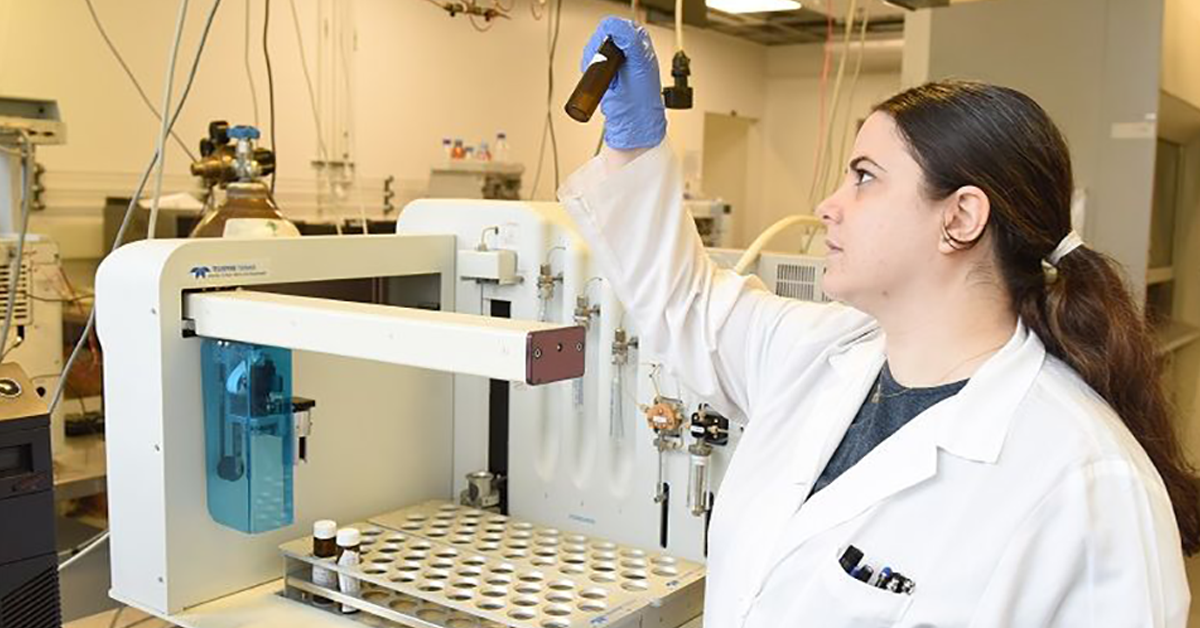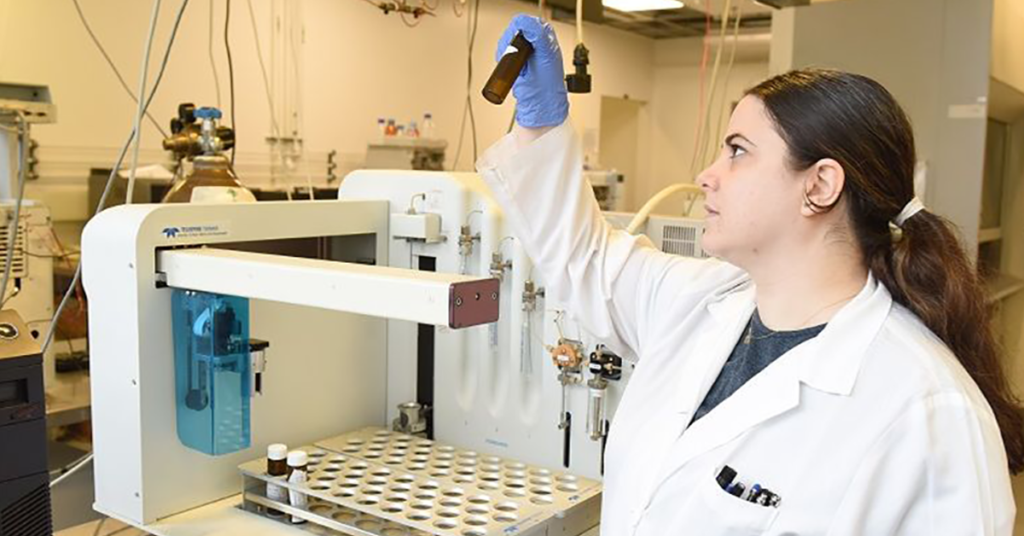 As part of its mission to connect agricultural businesses, academic institutes, researchers and knowledge providers, QOOT Cluster announced their partnership with the Laboratories for the Environment, Agriculture, and Food – LEAF at the American University of Beirut, during a virtual ceremony.
As part of its mission to connect agricultural businesses, academic institutes, researchers and knowledge providers, QOOT Cluster announced their partnership with the Laboratories for the Environment, Agriculture, and Food – LEAF at the American University of Beirut, during a virtual ceremony.
During the ceremony, Dr. Mohamad G. Abiad, Associate Professor and Director of LEAF ran a session on ‘Taking your product one step further”, focusing on the importance of R&D activities, especially in the agri-food sector. He presented the common trends present in the Food & Beverage industry, LEAF’s services provided to the industry, as well as the special discount QOOT Cluster members will benefit from.
Partnership agreement: benefits for QOOT members
This partnership between the agri-food economic players, mainly the private sector – QOOT members and the research institutions, will accelerate innovation in all agri-food sectors and help put Lebanon back on the global agri-food innovation map.
LEAF partnering with QOOT Cluster will present multiple benefits for agri-food companies. First and foremost, QOOT members will profit from discounted offers on laboratory testing services within LEAF’s expertise; discounts can range from 5% to 20%, depending on the total servicing amount. In addition to the discount rates, members will be eligible for free coaching sessions provided by LEAF staff (limits apply). Secondly, agri-food companies will have the opportunity to gain product development support within LEAF’s expertise. With LEAF’s expertise and support, QOOT members will “Take their products steps further!”
Why R&D?
Research and development (R&D) are crucial for any agri-food company’s survival to stay competitive in a fast-changing market needs and trends. It aims to create new products and launch them successfully, relying mainly on enhancing sensory properties that make food more attractive while improving nutritional value, reducing costs that lower product prices and offering greater food items to consumers while keeping up with competition and enhancing products for export.
What are the typical R&D activities that take place in the F&B industry?
- Developing new ingredients or formulas
- Creating a new flavor or product range
- Improving the food or drink’s nutritional content, taste, or texture
- Developing new samples or prototypes
- Devising ways to cut costs without reducing product quality
- Creating healthier product lines
- Coming up with ways to more sustainably package and transport a product
- Devising ways to lengthen a product’s shelf life
- Developing better ways to minimize contamination
- Coming up with innovative ways to deal with scrap, spoilage, and waste
- Export market and global competition
The top R&D trends impacting the food and beverage industry
- The use of sustainably sourced ingredients has become a need since the customer became more educated and aware about their purchase choices. The companies are more interested in supporting green, sustainable initiatives because they are more likely to be looked upon favorably than those that don’t.
- Targeted marketing is being more transparent. Customers are being more educated than before about the content of what they are putting in their bodies, and they are making health claims backed by science.
- Operating while reducing waste, a trend for years now, particularly regarding plastic waste. The challenge here is in creating food and drinks products with maximum taste and minimum packaging while cutting costs.
However, R&D presents loads of challenges, such as balancing new product failure with product obsolescence and balancing cost with overall financial setbacks. Not to mention consumers’ concerns on new food additives, addressing new trends (such as vegan, all-natural, etc.), and eco-friendly, green recycled packaging alarms. In addition to that, local and international regulations are to take into consideration while developing new products, regulations related to food safety, approved ingredients and additives, and standards and quality. Moreover, there’s a minimal level of integrating high technology in the food industry since the ‘old is gold’ type of thinking is very common, and industries don’t want to change what they are used to. The food industry, in all cases, has always been among the low spenders on R&D, which is why it is too common to see ‘me too’ competition.
Not to forget the main focal point in food industries: the consumers. Industries want to create attractive packaging that catches the consumer’s eye, developing high quality and safe products with healthy choices and giving them a choice for convenience and a reasonable value of the money. Therefore, industries need active consumer participation for validating the product to analyze their needs and speak the consumer’s language.
About the author
 Dr. Mohamad Abiad is currently the associate professor and director of Laboratories for the Environment, Agriculture, and Food (LEAF). He also holds an adjunct faculty position at the School of Packaging at Michigan State University (MSU). He holds a Bachelor of Engineering, an MBA, an MSE, and a Ph.D. in Food Process Engineering. He is a Lifetime Certified Packaging Professional from the Institute of Packaging Professionals; a certified environmental sampler; a certified Six Sigma Champion, certified by the Better Process Control School (FDA) on Canned Foods, Principles of Thermal Process Control, Acidification and Container Closure Evaluation; and PCQI Certified by the Food Safety Preventive Controls Alliance.
Dr. Mohamad Abiad is currently the associate professor and director of Laboratories for the Environment, Agriculture, and Food (LEAF). He also holds an adjunct faculty position at the School of Packaging at Michigan State University (MSU). He holds a Bachelor of Engineering, an MBA, an MSE, and a Ph.D. in Food Process Engineering. He is a Lifetime Certified Packaging Professional from the Institute of Packaging Professionals; a certified environmental sampler; a certified Six Sigma Champion, certified by the Better Process Control School (FDA) on Canned Foods, Principles of Thermal Process Control, Acidification and Container Closure Evaluation; and PCQI Certified by the Food Safety Preventive Controls Alliance.
Dr. Abiad is also a member of several professional organizations, including the Institute of Packaging Professionals, the Institute of Food Technologists; the International Society of Food Engineering; the Food Safety Alliance for Packaging; and the Order of Engineers and Architects – Beirut Chapter.
Dr. Abiad’s research interests include investigating issues related to food waste recycling, food packaging design, development, and testing. He has provided his expert opinion and consulting services to the Lebanese and Middle East and North Africa Agro-food industries at various levels, including Food Waste Reduction and Recycling; Package Testing and Evaluation; Shelf-life testing; Product development; Rheological Testing; and Chemical Analysis. Dr. Abiad is well published with more than 46 publications in international high-tier peer-reviewed journals and serves as an expert member of several national and regional food industry technical committees, including LIBNOR.
Dr. Abiad has also been working as an independent consultant for the agro-food industry in Lebanon and the Middle East and North African region with more than 20 years of experience in food processing and packaging. He has been providing his expert opinion, consulting, and training services to more than 25 private companies and governmental institutions in Lebanon and the region. He has worked with several funding programs, including the European Union, USAID, FAO, UNDP, ESCWA, among others. He has organized more than a dozen capacity-building workshops on various topics related to the food industry, food waste, and food loss and participating in various international conferences presenting his research.





